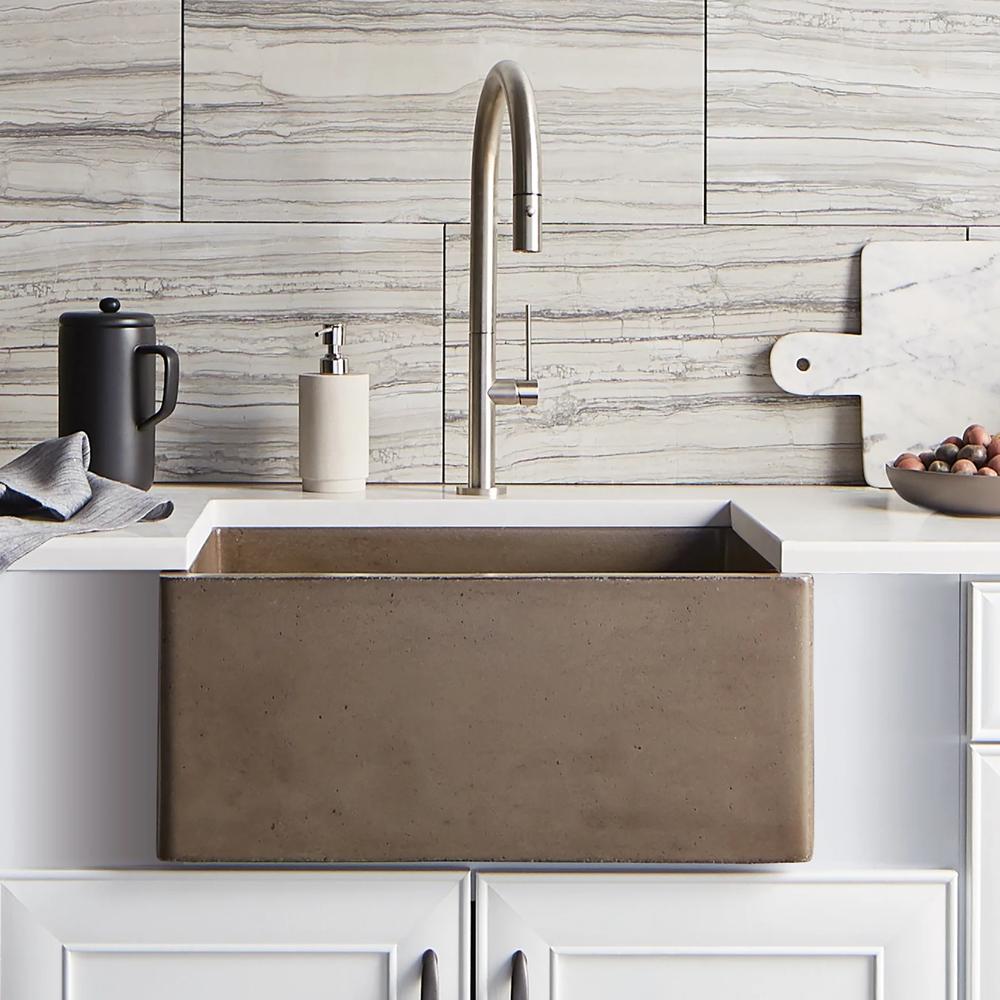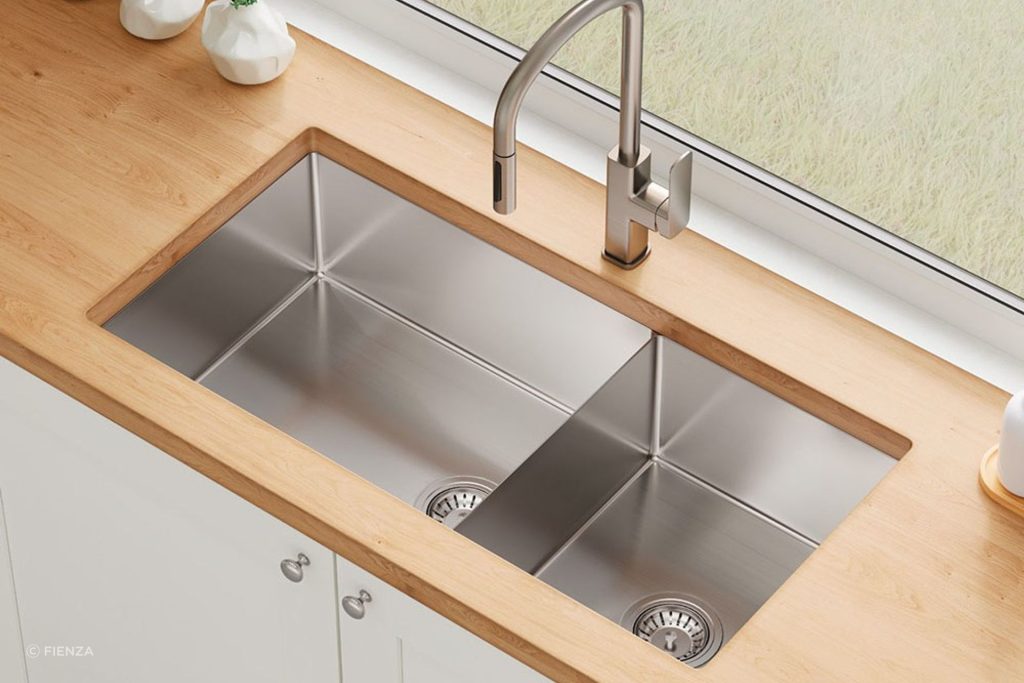Choosing the best material for your kitchen sink is more important than you might think. Your sink faces constant use, from washing dishes to prepping meals, so it needs to be strong, durable, and easy to clean.
But with so many options available, how do you know which one fits your style and daily needs? This article will guide you through the top materials, helping you find the perfect sink that combines beauty and function. Keep reading to discover the secrets behind each material and make a choice you’ll be happy with for years to come.

Credit: www.angi.com
Popular Kitchen Sink Materials
Choosing the right kitchen sink material enhances your kitchen’s functionality. Each material offers unique benefits and aesthetics. Understanding these options helps you make the best choice for your needs and style.
Stainless Steel Sinks
Stainless steel sinks are durable and affordable. They resist stains and heat. Their sleek look suits modern kitchens. They are easy to clean and maintain. Noise can be an issue without soundproofing.
Cast Iron Sinks
Cast iron sinks are strong and long-lasting. They come with a glossy enamel finish. This finish adds beauty and resists scratches. They are heavy and require sturdy support. Their classic look fits traditional kitchens.
Composite Granite Sinks
Composite granite sinks blend granite and acrylic resins. They resist chips and scratches. Their non-porous surface prevents stains. They offer a modern appearance. They are available in various colors.
Fireclay Sinks
Fireclay sinks are crafted from molded clay. They are fired at high temperatures. Their finish is smooth and glossy. Fireclay sinks resist chips and stains. They suit farmhouse and traditional kitchens.
Copper Sinks
Copper sinks bring a unique, antique charm. They are naturally antibacterial. They develop a patina over time. This adds character and warmth. They are softer and may dent or scratch.
Acrylic Sinks
Acrylic sinks are lightweight and cost-effective. They are easy to install. Their non-porous surface resists stains. They are available in many colors. They may scratch or crack more easily than other materials.
Durability Factors To Consider
Durability is a key factor when choosing the best material for a kitchen sink. A sink must handle daily wear and tear without losing its look or function. Different materials offer different strengths. Understanding durability helps pick a sink that lasts long and stays beautiful.
Scratch Resistance
Scratch resistance protects the sink surface from marks and scrapes. Materials like stainless steel can show scratches easily. Composite granite and quartz sinks resist scratches better. A scratch-resistant sink keeps its smooth and clean appearance over time.
Heat Resistance
Kitchens involve hot pots and pans. Heat resistance stops the sink from warping or cracking. Stainless steel and fireclay sinks handle high heat well. Some acrylic sinks may melt or deform under heat. Choose a sink that stays strong against hot temperatures.
Stain And Rust Resistance
Stains and rust spoil a sink’s look and hygiene. Stainless steel sinks with higher gauge resist rust better. Granite composite sinks do not stain easily. Porcelain sinks can stain but clean well. Materials that resist stains and rust keep sinks fresh and easy to maintain.
Impact Resistance
Kitchen sinks face drops of heavy pots or utensils. Impact resistance prevents cracks and chips. Cast iron and granite composite sinks absorb impacts well. Thin stainless steel sinks may dent. A sink with good impact resistance lasts longer without damage.
Maintenance And Care
Maintaining a kitchen sink properly keeps it looking new and working well. Different materials need specific care to avoid damage. Regular cleaning and proper handling extend the sink’s life and appearance. Understanding how to care for each material helps protect your investment.
Cleaning Tips For Different Materials
- Stainless Steel:Use mild soap and warm water. Avoid abrasive cleaners that scratch the surface.
- Porcelain:Clean with baking soda and a soft cloth. Avoid harsh chemicals that cause chips.
- Granite Composite:Use a gentle cleaner and soft sponge. Avoid bleach or acidic cleaners.
- Copper:Clean with a mixture of lemon juice and salt. Wipe dry to prevent water spots.
- Cast Iron:Use non-abrasive cleaners and avoid leaving standing water.
Preventing Damage And Wear
Do not place hot pots directly on the sink surface. Use a sink grid or mat to protect from scratches. Avoid dropping heavy items into the sink. Wipe the sink dry after use to prevent water stains and mineral build-up. Regularly check for cracks or chips and repair them promptly.
Longevity Expectations
Stainless steel sinks can last 15 to 30 years with care. Porcelain sinks typically last 10 to 20 years but need gentle handling. Granite composite sinks last about 15 years and resist stains well. Copper sinks may develop a natural patina but can last 20 years or more. Cast iron sinks last 20 to 50 years if maintained properly.
Cost And Installation
Choosing the right kitchen sink material goes beyond looks and durability. Cost and installation play a huge role in your decision. Understanding these factors helps you avoid surprises and plan your kitchen upgrade smartly.
Price Range Of Materials
Kitchen sinks come in a wide price range depending on the material. Stainless steel sinks are typically the most budget-friendly, starting around $100 and going up to $400.
Granite composite sinks often cost between $200 and $600, offering a balance of durability and style.
Porcelain and fireclay sinks usually fall between $250 and $800, but they require careful handling due to their fragility.
For luxury options like copper or quartz, expect to pay $700 and above.
Installation Requirements
The type of sink you choose affects how it’s installed. Drop-in sinks are the easiest and fastest to install, fitting into a cutout on the countertop.
Undermount sinks require precise countertop measurements and professional sealing to prevent water damage.
Heavy materials like granite or fireclay may need additional support under your countertop to avoid cracks.
Think about your countertop material too—some require special adhesives or techniques during installation.
Diy Vs Professional Installation
Can you install the sink yourself? If you’re comfortable with basic tools and plumbing, drop-in stainless steel sinks are often DIY-friendly.
More complex sinks, like undermount or heavy composite ones, usually demand a professional’s expertise to ensure proper fit and waterproofing.
Improper installation can lead to leaks, damage, or costly repairs down the road.
Ask yourself: Is saving on installation worth the risk of potential problems? Sometimes, hiring a pro saves time and money in the long run.
Aesthetic And Style Options
The look and feel of your kitchen sink can dramatically shape the overall vibe of your kitchen. Choosing the right material isn’t just about durability or cost; it’s about how the sink complements your style and the atmosphere you want to create. Consider how your sink will blend with your kitchen’s personality and how it stands out or blends in.
Color And Finish Choices
Kitchen sinks come in a wide range of colors and finishes, giving you plenty of freedom to match or contrast with your kitchen decor. Stainless steel sinks offer a sleek, modern look with a shiny or brushed finish that resists stains and scratches. On the other hand, composite granite sinks bring earthy tones like black, grey, or beige, adding warmth and texture.
Have you thought about how a matte finish might soften the light in your kitchen or how a glossy finish can make a small space feel larger? Color and finish impact not just aesthetics but also maintenance and longevity.
Matching Kitchen Design
Your sink should feel like part of the kitchen, not an afterthought. In a traditional kitchen, an apron-front sink in porcelain or fireclay can enhance the classic look. For modern kitchens, under-mount stainless steel or concrete sinks offer clean lines and minimal fuss.
Think about your countertops and cabinetry. Do you want your sink to blend in with the countertop material or stand out as a centerpiece? Matching or contrasting textures can either unify your design or create interesting focal points.
Trends In Sink Materials
Current trends show a rise in natural and sustainable materials. Recycled glass and concrete sinks are gaining popularity for their unique textures and eco-friendly appeal. Matte black and deep navy sinks are making waves for those wanting to add a bold statement without overwhelming the space.
Are you open to experimenting with trends that might age well, or do you prefer timeless styles? Balancing trendiness with practicality ensures your kitchen sink remains a stylish and functional feature for years.

Credit: thesinkboutique.com
Environmental Impact
Choosing the best material for your kitchen sink goes beyond durability and style—it has a real impact on the environment. Understanding how different materials affect the planet can help you make smarter choices that align with your values. Let’s break down the environmental footprint of popular sink materials to see what fits your eco-friendly goals.
Sustainability Of Materials
Some sink materials come from abundant natural resources, while others rely on mining or heavy processing. Stainless steel, for example, is made from iron and chromium, which are widely available but require energy-intensive extraction. On the other hand, natural stone sinks like granite demand quarrying, which can disrupt ecosystems.
Wooden sinks, though less common, use renewable resources and often come from sustainably managed forests. Considering the source and the extraction process matters because it affects how much harm is done to the environment before the sink even reaches your home.
Recyclability
Recyclability plays a huge role in reducing waste after your sink’s life cycle ends. Stainless steel shines here—it’s 100% recyclable without losing quality, which helps lower its overall environmental impact. Cast iron is also recyclable, but sinks coated with enamel may require special handling.
Composite sinks made from recycled materials or resins often pose challenges in recycling due to mixed substances. Ceramic sinks, while durable, are rarely recycled and usually end up in landfills. Knowing whether your sink material can be recycled can influence your decision and reduce long-term waste.
Eco-friendly Choices
Choosing eco-friendly sink materials means thinking about the entire journey—from sourcing to disposal. Concrete sinks can be an eco-friendly option if made with low-impact cement mixes and local materials. Bamboo sinks, though niche, offer renewable and biodegradable alternatives.
Consider sinks made with recycled metals or composites that minimize virgin resource use. Small changes, like selecting a recycled stainless steel sink, contribute to lowering your kitchen’s carbon footprint. What small step can you take today to make your kitchen greener?
Choosing The Right Sink For Your Needs
Choosing the right sink for your needs means thinking beyond just looks. Your kitchen sink is one of the busiest spots in the house, so it has to fit your daily routine and style. Understanding how you use your kitchen and what you expect from your sink will help you pick a material that lasts and feels right.
Assessing Kitchen Usage
How often do you cook or entertain guests? If your kitchen sees heavy traffic, you’ll want a sink material that stands up to constant use. Think about the types of tasks you do—washing large pots, prepping vegetables, or even soaking dishes.
If you’re someone who loves hosting, a deep and durable sink like stainless steel or fireclay might suit your lifestyle better. For light use or smaller kitchens, a compact porcelain or composite sink could work perfectly without overwhelming the space.
Balancing Durability And Budget
Durability often comes at a price, but that doesn’t mean you have to overspend. Set a budget that considers how long you want your sink to last and how much wear it will take.
Stainless steel sinks offer a good balance—they resist dents and stains without breaking the bank. On the other hand, granite composite sinks are more expensive but provide excellent scratch resistance and longevity.
Ask yourself, would you prefer replacing a cheaper sink every few years or investing more upfront for durability? This thought can guide your decision.
Personal Preferences
Your sink should reflect your taste and complement your kitchen’s design. Do you prefer a modern, sleek look or a classic, farmhouse style? Materials like copper add warmth and character, while quartz composite fits well in contemporary kitchens.
Also, consider maintenance. If you dislike frequent cleaning, avoid porous materials that stain easily. Your personal comfort with upkeep can be just as important as the sink’s appearance.
What qualities matter most to you—style, ease of cleaning, or longevity? Your answers will narrow down the best material for your kitchen sink.
:strip_icc()/the-best-kitchen-sinks-tout-e89b5134aa7f4ebb90cbcb4342c8e3a5.jpg)
Credit: www.bhg.com
Frequently Asked Questions
What Is The Most Durable Kitchen Sink Material?
Stainless steel is the most durable kitchen sink material. It resists stains, heat, and corrosion well. It also withstands heavy use and is easy to clean, making it a popular choice for busy kitchens.
Which Kitchen Sink Material Is Easiest To Maintain?
Composite granite sinks are easiest to maintain. They resist scratches and stains, requiring minimal cleaning effort. Just use mild soap and water regularly to keep them looking new and hygienic.
Are Stainless Steel Sinks Noisy During Use?
Yes, some stainless steel sinks can be noisy. Higher gauge sinks with soundproofing pads reduce noise significantly. Choose a thicker gauge for quieter and more durable performance in your kitchen.
What Kitchen Sink Material Offers The Best Heat Resistance?
Cast iron sinks with enamel coating offer excellent heat resistance. They can handle hot pots and pans without damage. This material also provides a classic look and long-lasting durability.
Conclusion
Choosing the best kitchen sink material depends on your needs and style. Stainless steel suits busy kitchens with its strength and easy cleaning. Granite offers a modern look and resists scratches well. Porcelain sinks add classic charm but need gentle care.
Consider durability, maintenance, and budget before deciding. A good sink lasts many years and makes your kitchen better. Think about what fits your home and daily use. This helps you pick the right sink material with confidence.

Hi, I’m Daniel Harper, a senior editor here at KitchenBucks.com. For over 10 years, I’ve been exploring kitchen gadgets and appliances to help people find tools that truly add value without breaking the bank. I love simplifying product choices so you can focus more on cooking and less on worrying about what to buy. When I’m not reviewing the latest gadgets, you’ll usually find me experimenting with coffee brewing or firing up the grill for a weekend barbecue.

